|
Health Watch
Beware of Rat fever! - Wild rats!
Nadira Gunatilleke
Maybe you are living in the city and have nothing to do with paddy
fields or mines. So may be you are thinking that you don’t need to worry
about Rat Fever (Leptospirosis). But do not forget that you have a nice
small garden where you often do gardening during the day and where wild
rats play and dance in the night! May be you often clean up the
drainages located inside your garden. We are talking about Rat fever.
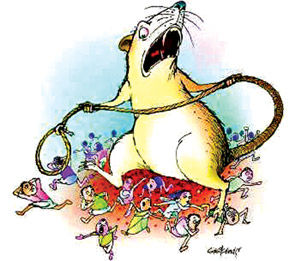
The number of Rat fever cases reported from Sri Lanka in the past two
months of this year is over 300. There are about five deaths reported
during the same period.
This is a significant improvement of the condition when compared to
last year’s situation. But still the threat is there and we need to be
vigilant especially when the rains come.
All of us know very well that prevention is better than cure. Why do
we have to put ourselves in danger when there is a clear way to prevent
a disease?
According to the Director of the Epidemiology Unit of the Healthcare
and Nutrition Ministry, Dr. Paba Palihawadana, the majority of the
affected persons are belong to the working force of the country who are
between the ages of 35 and 55.
The most affected districts are Colombo, Gampaha, Matara, Matale,
Kandy, Kegalle, Ratnapura, Kalutara and few other districts.
Wild rats living in an open environment are more dangerous than the
domestic rats.
The vulnerable people such as farmers, persons who clean drains,
persons who work in mines, marsh lands, canals and persons who swim or
play in contaminated water should contact the nearest PHI or MOH and
obtain Doxycycline tablets and they should take two tablets before they
start their work.
The tablets gives around 90 percent protection for a period of one
week.
Then they should take two tablets again until they finish their work.
|
Rat fever |
* Rat fever
is an infectious disease caused by pathogenic bacteria
* They live in the kidneys of animals such as rats, pigs,
cattle, rodents, canines and wild mammals
* Rat fever cases reported in the past two months is over 300
* Majority affected belong to the working force of the country
between the ages of 35 and 55
* Affected districts: Colombo, Gampaha, Matara, Matale, Kandy,
Kegalle, Ratnapura, Kalutara |
The public should avoid contaminated water such as flood water.
Paddy fields should be kept clean without garbage and places with
still water. This is the harvesting season and farmers spend more on the
paddy fields. The persons who have cuts and wounds (open injuries) in
their legs should cover them properly before stepping into the paddy
fields.
Rat fever is an infectious disease caused by pathogenic bacteria and
live in the kidneys of animals such as rats, pigs, cattle, rodents,
canines and wild mammals.
It comes to soil, water or food through their urine and enters into
human body through cuts, wounds, nasal, oral, eye or mucous membranes.
The bacteria lives in the environment over a period of one month.
The main symptoms of Rat fever are abrupt onset of high fever, mild
flu, chills, conjunctival suffusion, muscle tenderness (notable in calf
and lumber areas), intense headache, jaundice area and decrease of
passing urine.
|

Wild rats living in an open environment |
The symptoms arise after 5 to 14 days of infection. It is very
important to seek medical treatment as early as possible from a
Government hospital.
The disease can be completely cured if medical treatment is given on
time but it is difficult to save the life of a patient who seeks medical
treatment when the disease comes to later stages where renal failure,
heart failure and other symptoms appear.
Healthcare and Nutrition Ministry has decided to import ‘Biorat’
bacteria from Cuba shortly in order to curb leptospirosis. Biorat is a
biological method that can be used to control rat fever.
The ministry has made this decision considering the fact that the
existing chemicals only kill domestic rats and not wild rats living in
paddy fields, drains and other places such as the open environment.
The ministry is now in the process of obtaining the permanent
registration for `Biorat’ from the Pesticides Registration Department.
If you are very concerned about your appearance, what you wear, what you
eat and what you drink.
So why don’t you worry about cleanliness of your home garden?
Why do you wait for others (often it is the state) to come and clean
the environment for you? Keeping your homegarden clean will keep you
away from rat fever, dengue and many other diseases.
Answers for the health queries
1. Question on Bell’s palsy:
Spontaneous improvement of this condition usually occurs within few
weeks. Then continuing recovery occurs but it may take even a year to
become complete in some instances. Around 15 percent of patients are
left with some residual weakness. Therefore, it is needed to help the
patient, physically and psychologically till few weeks or months. If the
weakness is progressing, reassessment of the condition may be necessary
to distinguish from other lesions of the facial nerve.
2. Question on catarrh/Allergic
Rhinitis:
This is a common condition characterized by variable nasal
obstruction, watery rhinorrhoea, sneezing and reduction of smell.
The avoidance of responsible specific allergens is a good option if
practical (house dust mite, dog hair, cat fur etc.). The drugs such as
antihistamines, topical steroids are of value in controlling the
condition. A prolonged course may be needed in reducing mucosal
sensitivity.
3. Question on feeling of pins and
needle:
Sometimes this type of feeling may be due to a pathological process
affecting a peripheral nerve or nerves. Diabetes, Hypothyroidism,
Rheumatoid arthritis could be included among probable common causes for
neuropathies.
It is advisable to contact your family doctor to get investigated if
necessary.
4. Question on pain, tiredness
(person in the age of 69):
There are several complaints such as pain in the body, tiredness,
nasal block etc. According to information given, serological (blood)
investigations have been done and found normal.
There is a common topic today, called “Medically unexplained
symptoms”. The symptoms or manifestations are defined as such when “the
clinical presentation and the symptoms are incompatible with a known
physical illness, and/or absence of relevant positive physical signs
and/or absence of laboratory investigations supporting a diagnosis of a
physical illness”.
As such it may be helpful in changing the life style to ensure
relaxation, physically and psychologically. A balanced diet , adequate
water, regular exercises such as walking and adequate rest and sleep at
least 7 to 8 hours in a day will be needed for healthy life. It is
necessary to get rid of thoughts related with problems in the past to
have a balanced and peaceful mind.
5. Question on drug allergy - allergy
to pain killers:
A large number of pains relieving medications are belonged to the
group of NSAID (Non-Steroidal Anti-Inflammatory Drugs) that are closely
related to Aspirin. Diclofenec, Ibuprofen, Piroxycam, Indomethazine are
some of drugs in the NSAID list.
NSAID allergy is estimated to be present in approximately 1 percent
of the general population. According to the information given in this
question, even a paracetamol which is in the list of another pain
relieving drugs has caused problems. It is important that any person
with a known or suspected allergy to a drug consult with their physician
before using any product that may be related to the group of drugs,
causing allergies.
It is advisable to meet a physician as there are few drugs which may
be tolerated well with the persons having this type of allergies.
World Glaucoma Day celebrated on March 12
Nadira Gunatilleke
|
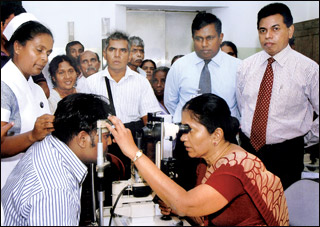
A special eye clinic was held at Colombo National Hospital to
mark Wold Glaucoma Day. Eye Surgeon Champa Banagala examining a
patients while Health Services (Public Health) Deputy Director
General, Dr. Palitha Maheepala and others look on. |
Glaucoma is a disease in which the optic nerve is damaged, leading to
progressive, irreversible loss of vision. It is often, but not always,
associated with increased pressure of the fluid in the eye.
The nerve damage involves loss of retinal ganglion cells in a
characteristic pattern. There are many different sub-types of glaucoma
but they can all be considered as a type of optic neuropathy.
A person may develop nerve damage at a relatively low pressure, while
another person may have high eye pressure for years and yet never
develop damage.
Untreated glaucoma leads to permanent damage of the optic nerve and
resultant visual field loss, which can progress to blindness. Around 12
percent of the total population of Sri Lanka suffer from Glaucoma and
5.7 million persons in the world suffer from Glaucoma.
Glaucoma can be completely cured if diagnosed early and treated
properly. Diabetics, eye injuries, wearing thick spectacles can cause
Glaucoma. Persons who are above the age of 40 and who have family
history are in the high risk category.
Sri Lanka celebrated World Glaucoma Day on March 12. A special eye
clinic was held at the Colombo National Hospital to mark this day and
around 500 patients were examined during the clinic.
Sexually transmitted infections:
A social issue
Sexually Transmitted Infections (STI) have been present since ancient
times as described by Egyptians long ago. Greek and Romans in the field
of medicine have reported on these diseases.
|
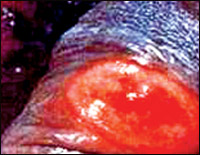
Genital Herpes |
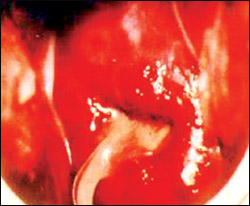 World
Health Organization (WHO) estimated, 340 million new cases in 1999 among
men and women aged 15 to 49 years. We are living in the region of South
and Southeast Asia in which the largest number of new infections
occurred. Next in line are the sub Saharan Africa, Latin America and the
Caribbean. World
Health Organization (WHO) estimated, 340 million new cases in 1999 among
men and women aged 15 to 49 years. We are living in the region of South
and Southeast Asia in which the largest number of new infections
occurred. Next in line are the sub Saharan Africa, Latin America and the
Caribbean.
As the main mode of transmission is through an unprotected sexual
contact these infections are called STI. However diseases of the genital
area are not necessarily transmitted through sexual contact.
In addition to the main way of transmission, some STIs can be
transmitted through blood ( HIV, Syphilis etc) or through an infected
pregnant mother to an unborn child.(HIV, Syphilis, Gonorrhoea, Non
Gonococcal cervicitis etc).
A large number of STIs are caused by bacteria, viruses and parasites.
The common diseases vary from country to country. In Sri Lanka Genital
herpes, Genital warts, Syphilis, Gonorrhoea, Non Gonococcal urethritis/cervicitis
and Tricomoniasis commonly occur. Genital Herpes and Genital warts are
caused by viruses. Syphilis, Gonorrhoea and Non Gonococcal Urethritis/cervicitis
are caused by bacteria and Trichomoniasis is caused by a parasite. Most
of these diseases, namely, Syphilis, Gonorrhoea, Non Gonococcal
Urethritis/cervicitis and Trichomoniasis can be completely cured when
the patient gets proper treatment at correct time.
Even those curable diseases can cause problems and complications if
there is delay in receiving treatment.
Out of the STIs in Sri Lanka, Genital Herpes and Genital warts are
reported predominantly. It has become a family and social issue as those
infections which are viral in origin, have the ability to reappear in
time to time during the life.
|
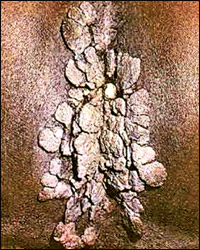
Some types of Genital warts |
In generally three main symptoms, occurring in STIs are genital
ulcers, genital discharge and genital lumps. The genital ulcers are seen
in Syphilis and Genital Herpes.
The genital discharge is seen in Gonorrhoea, Non Gonococcal
urethritis/cervicitis and Trichomonisis .
The genital lumps are seen in Genital Warts.
|
Sexually
Transmitted Infections (STIs) |
*
Transmission is through an unprotected sexual contact
* South and Southeast Asia the area to have largest number
of new infections
* Infections caused by bacteria, viruses and parasites
* Sri Lanka Genital herpes, Genital warts, Syphilis,
Gonorrhoea, Non Gonococcal urethritis /cervicitis and
Tricomoniasis commonly occur
* Have the ability to reappear in time to time
* Three main symptoms , occurring in STIs are genital ulcers
, genital discharge and genital lumps. |
Commonly there is a psychological disturbance of the people on
developing disease manifestations in genital region. Genital ulcers,
genital discharge and genital lumps could be seen even in diseases,
other than STIs.
Genital ulcers could be seen in drug reactions and in the fungal
infections such as candidiasis. Genital discharge occurs in bacterial
vaginosis and candidiasis. Genital lumps could be seen in benign penile
papille and sebaceous cysts. These are not STIs and it is vital to get
necessary medical advice and treatment on appearing these symptoms. If
it is a STI both the patient and the partner should be treated at the
same time even if the partner is free of clinical manifestations as the
infection has been exchanged among them.
STIs causing genital ulcers
Syphilis: The infective organism is a bacteria, called treponema
pallidum. When infected the patient may develop the stage of primary
syphilis, in about 9 to 90 days. The main clinical manifestation is a
painless and deep ulcer usually single. It is completely curable but if
not treated the patient may proceed to secondary syphilis in about 3 to
6 months.
Dr. Shantha Hettiarachchi
Coordinator
Mass Communication
Publicity Unit
Health Education Bureau
Ministry of Healthcare
and Nutrition.
To be continued |



